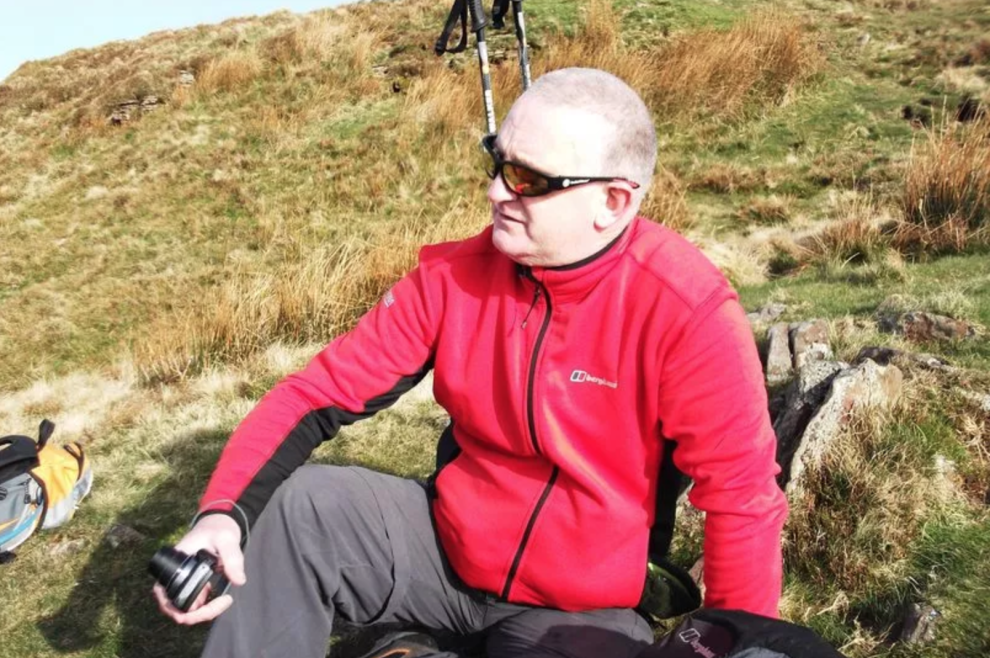Mid Glamorgan resident, Graham Waring is attending a debate at the Senedd on the 6th of December, for Pancreatic Cancer Awareness Month, after he was diagnosed himself almost 15 years ago.
Graham was lucky to be diagnosed early enough for the only potentially curative treatment, surgery. He now joins the less than seven per cent of people that survive beyond five years and is sharing his story this Pancreatic Cancer Awareness Month, and attending the Senedd debate, to give others hope, stress the importance of early detection, and encourage change.
Tragically 80 per cent of people with pancreatic cancer are not diagnosed until after the disease has spread – almost double the proportion for other cancers. This has contributed to pancreatic cancer having the lowest treatment rate (34%) of any common cancer- comparing poorly with treatment rates for breast (86%), bowel (74%) and lung (56%), cancers (1). More than half of people with pancreatic cancer die within three months of diagnosis, making it the deadliest common cancer.
In 2009, Graham started to experience bad stomach pains. He had just returned from working away on an oil rig and there was some uncertainty surrounding his future employment. He put his stomach issues down to an IBS flare up due to nerves and purchased some over-the-counter remedies, but nothing was working. He also noted weight-loss but put this down to stress. After 10 days however, he reluctantly went to the doctor.
Healthcare Support Worker, Graham, 62 said: “Normally I would just put up with the discomfort and pass it off, but something told me to get checked out. The doctor ordered a routine blood test. About a week later I was at the other side of the UK on a survival course when my wife phoned to say I needed to ring the doctor about my blood results as there was concern about my liver function. I shrugged it off as something minor.”
Graham’s doctor told him that he had an abnormally high enzyme count, and he sent him for an ultrasound. During the ultrasound, the consultant told Graham he wouldn’t be returning to work the next day like planned. They needed to send him for a CT scan, which he had straight away. As he was walking back to the car, his GP messaged him saying he needed to come to see him.
Graham said: “In the surgery waiting room I can remember being my usual jovial self, unprepared for the bombshell about to be dropped. When we were told, total shock came over both myself and my wife, who was in tears.”
The major cause of late diagnosis is pancreatic cancer’s vague symptoms – such as back pain, indigestion and unexpected weight-loss – because these are also common to many less serious health conditions. With no early detection tools to help them, it is very difficult for GPs to identify who should be urgently referred for scans to confirm or rule out the disease. Nearly half of all pancreatic cancer patients are currently diagnosed via an emergency (such as through visiting A&E) (2).
Graham’s GP told him the tumour was small and that as far as they could tell, all other vital organs were clear from spread. It looked operable, which is something very few patients hear. Of the 10,500 people diagnosed annually in the UK just 10% have the operation. (3)
Graham said: “We left the GP surgery in a daze. We didn’t tell the kids initially, who were 13 and 10 at the time, as we didn’t want to worry them. I did go home and look up pancreatic cancer though and well, that certainly made me despair. The statistics were dire.”
Graham saw the registrar the following Tuesday who confirmed the findings; he did have pancreatic cancer. He reiterated that it had been picked up early and he was positive Graham would make a full recovery if he made it through surgery. As he readied himself for final tests prior to the operation, Graham received the devastating news that he would be placed on unpaid medical leave.
Graham said: “We were on rock bottom at this point, the only way from here was up, so that’s what we did, picked ourselves up and got on with it. We decided to tell the kids as we knew they had a right to know rather than find out from someone else. It was very emotional; loads of tears from everyone but it was a weight off our minds that they knew. Now I just needed confirmation I could have the operation. I was scared stiff.”
Luckily for Graham, further test results looked favourable, and he was told he was a priority for surgery. The date for his surgery was booked in eight weeks on from the initial scan. He said goodbye to his family and was wheeled down.
Graham said: “The next thing I remember is waking up 9 hours later in recovery. They quickly took X-rays to make sure they hadn’t missed anything and sent me straight to the high-dependency unit. The first night I was a bit groggy but the following day they got me out of bed straight away to get me mobile. I was in there for three days before being sent to the ward. They encouraged me to walk around to build my strength up.”
Graham spent eight nights in hospital following the surgery before being discharged. He was told he’d need six months of chemotherapy. After four rounds, Graham kept being sick before or after his treatment, but he persisted.
Graham said: “When I went to see my consultant after the chemo, he said that all my blood results were fine and that he didn’t want to see me again. It was the best news you could want. My daughter wanted a party, but I didn’t want to celebrate because it was still early days. It could have come back.”
Now, 15 year later, Graham realises how lucky he has been. He is joining Pancreatic Cancer UK this Pancreatic Cancer Awareness Month, calling for people to familiarise themselves with pancreatic cancer, the symptoms to be aware of, and the impact it can have on people diagnosed and their families. They encourage the public to have conversations with friends, family, and colleagues about the deadliest common cancer, in the hopes that it could prevent a late diagnosis in the future.
Graham said: “I look at life totally different now. You never know what’s round the corner. I had cancer; I was lucky to get over it and I’m lucky to be where I am now. If I’d left it just a few more weeks to see my doctor, I wouldn’t be here to share my story now. If you’re concerned about symptoms, talk to your GP. And do your best to stay positive; it really does make a difference.”
Pancreatic Cancer UK recommends that anyone experiencing one or more of the most common symptoms – back pain, indigestion, tummy pain and weight-loss – for more than four weeks should contact their GP. Anyone with jaundice (yellowing of the eyes or skin) should immediately go to A&E. Early diagnosis is crucial in improving both survival and quality of life.
Diana Jupp, CEO of Pancreatic Cancer UK, said:
“Tragically, for thousands of people each year their pancreatic cancer goes undetected until after it is too late to save them. Early diagnosis is vitally important to giving those with this devastating disease the best possible chance of survival, more so than with any other common cancer.
“That’s why for Pancreatic Cancer Awareness Month this November, we are urging the public to learn more about the disease, to talk to their loved ones and, if they have persistent symptoms, not to put off seeing their GP.
“We do not want people to panic if they have some or all these symptoms. They are also shared by many other less serious health conditions and most people experiencing them will not have pancreatic cancer. Yet awareness is worryingly low, and while our teams of worldclass researchers continue to develop the early detection tools desperately needed by doctors, we need the public’s help to breakthrough the silence around the deadliest common cancer in the UK.”
The charity runs the Pancreatic Cancer UK Support Line, which is staffed entirely by specialist nurses and is open to anyone affected by pancreatic cancer – including family and friends. All calls are free and confidential. For more information visit: www.pancreaticcancer.org.uk/support



















